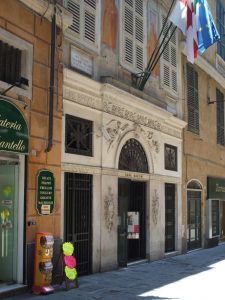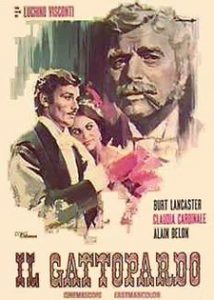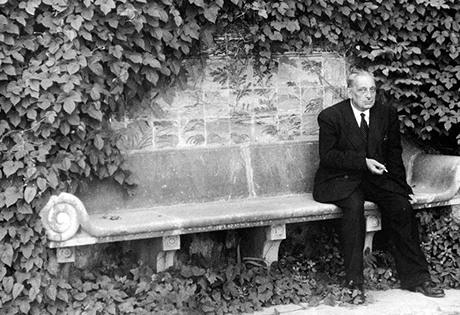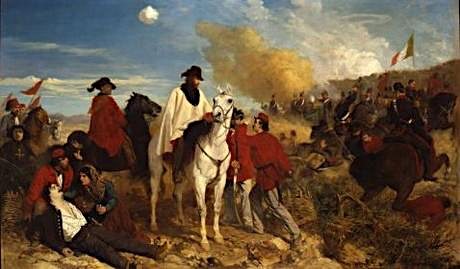Week 11
Week 11: Tuesday, January 9, 2018
Italy in the Eighteenth Century
During our first class in Winter Quarter, we need to look back at the period between the War of Spanish Succession (1700-1710) and the French Revolution. Italy in the Eighteenth Century. Politically, Italy is in decline with outside powers (Spain and Austria) dominating her territory. But culturally, it is a period of exceptional significance. People from all over the world, travel to Italy to learn from her, and enjoy her beauty, to visit her capital, and to study her painters. You see the work of one of those painters, Canaletto, above.
REQUIRED READING FOR WINTER QUARTER: TWO BOOKS
This is one of the greatest novels ever written in Italian. We are fortunate to have it as our reading for the whole of the Winter Quarter. I would suggest you read it slowly and ejoy it over the ten weeks of our study.
Make sure you are buying this edition since it has been updated in 2007.

Giuseppe Di Lampedusa,
The Leopard: A Novel,
Pantheon; Reprint edition (November 6, 2007),
ISBN 0375714790
The Duggan book is a general history of Italy that will serve you for the whole year.

Christopher Duggan,
A Concise History of Italy,
Cambridge University Press; 2 edition (January 20, 2014),
ISBN 0521747430
12
Week 12: Tuesday, January 16, 2018
Revolution, Empire and Italy
From 1789 to 1815 France dominated the politics of Europe. First came the Revolution which began in June of 1789, and wandered through the next ten years during which France declared war on various European powers whom the French considered (and were!) enemies. French Revolutionary forces led by Bonaparte invaded Italy in 1796 and then came back many times more. With the rise of Napoleon into imperial status and power, France took over the rule of much of Italy. Napoleon installed his family in friends in various states and by the time of his fall in 1815, Italy had been transformed.
REQUIRED READING
Make sure you are buying this edition since it has been updated in 2007.

Giuseppe Di Lampedusa,
The Leopard: A Novel,
Pantheon; Reprint edition (November 6, 2007),
ISBN 0375714790

Christopher Duggan,
A Concise History of Italy,
Cambridge University Press; 2 edition (January 20, 2014),
ISBN 0521747430
13
Week 13: Tuesday, January 23, 2018
The Congress of Vienna, 1814-1815
In 1814, the European powers gathered together in Vienna to decide what to do about all the borders of all the countries that had been caught up in the just conclude Revolutionary and Napoleonic Wars. Italy was, of course, included. The decision of the conference was to send back all the rulers who had been displaced by the wars no matter what any individual state might prefer. All rulers would come back to their previous governmental roles. This meant that many hated rulers rode back into their countries thanks to the Vienna conference. This was the state of affairs for Spain. The royal family was now loathed throughout the Iberian peninsula, but they came back to power anyway. This was true also in various parts of Italy. For example, in Naples where the Bourbon kings were hated, they came back anyway. Thus, in 1816, various states resumed almost where they had left off in 1789. But, of course, everything had changed. And in Italy, the thing that had changed most was that the people had had a taste of modern liberty. And they liked it.
REQUIRED READING
Make sure you are buying this edition since it has been updated in 2007.

Giuseppe Di Lampedusa,
The Leopard: A Novel,
Pantheon; Reprint edition (November 6, 2007),
ISBN 0375714790

Christopher Duggan,
A Concise History of Italy,
Cambridge University Press; 2 edition (January 20, 2014),
ISBN 0521747430
RECOMMENDED BOOK

David King,
Vienna, 1814: How the Conquerors of Napoleon Made Love, War, and Peace at the Congress of Vienna,
Broadway; Reprint edition (March 24, 2009),
ISBN 0312372973
From Publishers Weekly
Leaders from the world's five major diplomatic forces - Great Britain, France, Austria, Prussia and Russia - convened in Vienna in 1814 to found a new order for post-Napoleonic Europe. Historian King (Finding Atlantis) calls it the greatest and most lavish party in history, at which delegates would plot, scheme, jockey for position, and, in short, infuriate each other as they competed in affairs of state and the heart. King covers the diplomatic wrangling well, particularly over the fates of Poland, Saxony and the Kingdom of Naples. His greater strength is in depicting the personalities and motivations of the key players, such as Metternich's daring love affair with a baroness and Czar Alexander I's growing reliance on a German mystic. Despite endless parties, the Congress achieved pioneering work in culture and human rights, including Jewish rights and a vote to abolish slavery. Most important, it established alliances that defeated Napoleon's attempt to regain power in 1815 and helped foster a spirit of cooperation that, in some ways, has still not been surpassed. King's fine work is not quite as scholarly as the book it recalls, Margaret Macmillan's Paris 1919, but it is more deftly paced and engagingly written. 16 pages of b&w photos. (Mar.) Copyright © Reed Business Information, a division of Reed Elsevier Inc. All rights reserved. --This text refers to the Hardcover edition.
Review
"King reveals his talent for narrative flow and portraiture in a biography that will thoroughly inveigle history readers." - Booklist
"A teeming…personality-rich panorama of the first truly international peace conference." - Kirkus Reviews
"A fascinating tale that shines light on a unique aspect of the relationship between scholarship and nationalism." - Choice
RECOMMENDED BOOK

David Lawday,
Napoleon's Master: A Life of Prince Talleyrand,
Thomas Dunne Books (November 13, 2007),
ISBN 0312372973
From Publishers Weekly
Charles-Maurice de Tallyrand-Perigord (1754-1838) was a diplomat for all regimes. He had major French governmental posts, including brief stints as prime minister, for nearly four decades: during the post-terror phase of the French Revolution and then under Napoleon and the Bourbon King Louis XVIII. As portrayed by Lawday, a former correspondent for the Economist, Talleyrand was a womanizer (he and Gouverneur Morris, then the American ambassador to Paris, competed for the same mistress) and a Thurs.ey-grubber, with a certain aristocratic hauteur. Yet Tallyrand was gifted at diplomacy: he was patient, an exceptional listener and, most important, a conciliator. Having had an exceptionally close relationship with Napoleon, he came to staunchly oppose the emperor's insatiable ambition and even committed near-treason in his complicity with Austria and Russia against Napoleon. Lawday devotes appropriate space to Talleyrand's finest moment, the 1815 Congress of Vienna, where his skills steered the assembled diplomats to allowing France to remain an integral part of the concert of Europe. Though comprehensive and quite good, Lawday's biography is long on narrative, hewing closely to the details of Tallyrand's unfolding life, but short on analyses of Tallyrand's choices and of the broader French and European contexts in which he acted. 8 pages of b&w photos; maps. (Nov.) Copyright © Reed Business Information, a division of Reed Elsevier Inc. All rights reserved.
Reviews
"Swift, informed and literate." ---Kirkus Reviews
"Comprehensive and quite good." ---Publishers Weekly
14
Week 14: Tuesday, January 30, 2018
Giuseppe Mazzini
Giuseppe Mazzini (1805-1872) was one of the four men who made the new unified Modern Italy: Cavour, Garibaldi, King Vittorio Emanuele, and Mazzini. Of the four, Mazzini is the least known outside of Italy. But he is far from the least influential. In fact, one could argue that in the beginning, he is the most influential. His organization, Giovine Italia, whch flourished all over Italy from the 1830's on, prepared the ground for the unification thirty years later. And his influence continued all through the Nineteenth Century.Here you see a portrait of Mazzini and his house in Genova where he was born.
REQUIRED READING

Giuseppe Di Lampedusa,
The Leopard: A Novel,
Pantheon; Reprint edition (November 6, 2007),
ISBN 0375714790

Christopher Duggan,
A Concise History of Italy,
Cambridge University Press; 2 edition (January 20, 2014),
ISBN 0521747430
15
Week 15: Tuesday, February 6, 2018
The Kingdom of Savoy, Piedmont, & Sardinia
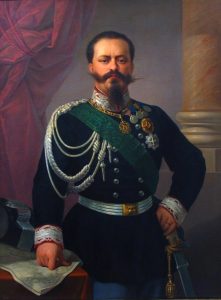
Modern Italy, the state that we all know in our own times was created around the state of Savoy. Savoy was a small, ancient l duchy nestled into the Alpine valleys between northern Italy and southeastern France. The duchy had always straddled the Alps with a French and an Italian side. The ruling family, one of the oldest in the world, ruled from the capital of Turin. By the early Nineteenth Century, the family now carried the title of "king" of not only Savoy, but also the Italian province of Piedmont as well as the island Sardinia. From within this old European family emerged Vittorio Emanuele II who became King in 1849. He was the man who was indispensable in the unification movement. You see him here on the page dressed in his military uniform: Vittorio Emanuele II, 1820-1878, son of the King of Sardinia, Carlo Alberto (1798-1849), King of Sardinia, 1849-1861, King of Italy, 1861-1878, succeeded by his son, Umberto I (1844-1900), King of Italy, 1878-1900.
REQUIRED BOOKS FOR WINTER QUARTER

Giuseppe Di Lampedusa,
The Leopard: A Novel,
Pantheon; Reprint edition (November 6, 2007),
ISBN 0375714790

Christopher Duggan,
A Concise History of Italy,
Cambridge University Press; 2 edition (January 20, 2014),
ISBN 0521747430
16
Week 16: Tuesday, February 13, 2018
The Leopard
Giuseppe Tomasi di Lampedusa ; December 23, 1896 – July 26, 1957) was an Italian writer and the last Prince of Lampedusa. He is most famous for his only novel, Il Gattopardo (first published posthumously in 1958), which is set in his native Sicily during the Risorgimento. A taciturn and solitary man, he spent a great deal of his time reading and meditating, and used to say of himself, "I was a boy who liked solitude, who preferred the company of things to that of people."
Tomasi was born in Palermo to Giulio Maria Tomasi, Prince of Lampedusa and Duke of Palma di Montechiaro (1868–1934), and Beatrice Mastrogiovanni Tasca Filangieri di Cutò (1870–1946). He became an only child after the death (from diphtheria) in 1897 of his sister Stefania. He was very close to his mother, a strong personality who influenced him a great deal, especially because his father was rather cold and detached. As a child he studied in their grand house in Palermo with a tutor (including the subjects of literature and English), with his mother (who taught him French), and with a grandmother who read him the novels of Emilio Salgari. In the little theater of the house in Santa Margherita di Belice, where he spent long vacations, he first saw a performance of Hamlet, performed by a company of travelling players. His cousin was Fulco di Verdura.
Beginning in 1911, he attended the liceo classico in Rome and later in Palermo. He moved definitively to Rome in 1915 and enrolled in the faculty of jurisprudence. However, that year he was drafted into the army, fought in the lost battle of Caporetto, and was taken prisoner by the Austro-Hungarian Army. He was held in a POW camp in Hungary, but succeeded in escaping and returning to Italy. After being mustered out of the army as a lieutenant, he returned to Sicily, alternately resting there and travelling with his mother, and continuing his studies of foreign literature. It was during this time that he first drafted in his mind the ideas for his future novel The Leopard. Originally his plan was to have the entire novel occur over the course of one day, similar to the famous modernist novel by James Joyce, Ulysses.
In 1932 in Riga he married the daughter of Alice Barbi, Alexandra von Wolff-Stomersee (de) (1894–1982), nicknamed "Licy", a Baltic German noblewoman and a student of psychoanalysis. The marriage ceremony was celebrated in the Orthodox church of the Annunciation of Our Most Holy Lady Church, Riga. They first lived with Tomasi's mother in Palermo, but soon the incompatibility between the two women drove Licy back to Riga.
In 1934 Tomasi di Lampedusa's father died, and he inherited his princely title. He was briefly called back to arms in 1940, but, as owner of a hereditary agricultural estate, was soon sent back home to take care of its affairs. He and his mother ultimately took refuge in Capo d'Orlando, where he was reunited with Licy. They survived the war, but their palace in Palermo did not.
After his mother died in 1946, Tomasi returned to live with his wife in Palermo. In 1953 he began to spend time with a group of young intellectuals, one of whom was Gioacchino Lanza Tomasi, a cousin, with whom he developed such a close relationship that, the following year, he legally adopted him.
Tomasi di Lampedusa was often the guest of his cousin, the poet Lucio Piccolo, with whom he travelled in 1954 to San Pellegrino Terme to attend a literary awards ceremony, where he met, among others, Eugenio Montale and Maria Bellonci. It is said that it was upon returning from this trip that he commenced writing Il Gattopardo (The Leopard), which was finished in 1956. During his life, the novel was rejected by the two publishers to whom Tomasi submitted it.
In 1957 Tomasi di Lampedusa was diagnosed with lung cancer; he died on July 26 in Rome. Following a requiem in the Basilica del Sacro Cuore di Gesù in Rome, he was buried in the Capuchin cemetery of Palermo. His novel was published the year after his death. Elena Croce (it) had sent it to the writer Giorgio Bassani, who brought it to the attention of the Feltrinelli publishing house. Il Gattopardo was quickly recognized as a great work of Italian literature. In 1959 Tomasi di Lampedusa was posthumously awarded the prestigious Strega Prize for the novel. (WIKIPEDIA)
REQUIRED BOOKS FOR WINTER QUARTER

Giuseppe Di Lampedusa,
The Leopard: A Novel,
Pantheon; Reprint edition (November 6, 2007),
ISBN 0375714790

Christopher Duggan,
A Concise History of Italy,
Cambridge University Press; 2 edition (January 20, 2014),
ISBN 0521747430
17
Week 17: Tuesday, February 20, 2018
Camillo Benso, Count of Cavour
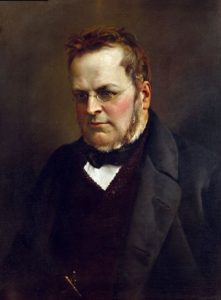
Cavour (1810-1861) has always been seen as the indispensable man in the story of the unification of Italy. But, without the King, there might have been no unification. Maybe: ever! But if the person, the royal person of Vittorio Emanuele II, was essential in order to create a unified Italian peninsula, none of it would have happened without Cavour. He had a plan, a secret plan, and it worked. He did not live to see it work. He died(1861)just when Italy needed him the most, exactly as the United States lost its Lincoln at the crucial moment.
REQUIRED BOOKS FOR WINTER QUARTER
Make sure you are buying this edition since it has been updated in 2007.

Giuseppe Di Lampedusa,
The Leopard: A Novel,
Pantheon; Reprint edition (November 6, 2007),
ISBN 0375714790

Christopher Duggan,
A Concise History of Italy,
Cambridge University Press; 2 edition (January 20, 2014),
ISBN 0521747430
18
Week 18: Tuesday, February 27, 2018
Giuseppe Garibaldi
Giuseppe Garibaldi (1807-1882) is the fourth man in the quartet of the founders of unified Italy. Garibaldi was the most popular of all the leaders of the Risorgimento. More popular than the King himself. Garibaldi was a man of action; he was a military leader, a hero on a horse, a romantic figure with a romantic story, a fascinating wife who fought at his side.
REQUIRED BOOKS FOR WINTER QUARTER

Giuseppe Di Lampedusa,
The Leopard: A Novel,
Pantheon; Reprint edition (November 6, 2007),
ISBN 0375714790

Christopher Duggan,
A Concise History of Italy,
Cambridge University Press; 2 edition (January 20, 2014),
ISBN 0521747430
19
Week 19: Tuesday, March 6, 2018
Garibaldi in Sicily
On May 11, 1860, 2:00 PM Garibaldi and his One Thousand landed at Marsala on the west coast of Sicily. Garibaldi's invasion of Sicily broke open the movement to unification. Garibaldi suddenly became the hero of the national movement.
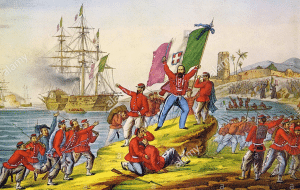
REQUIRED READING FOR WINTER QUARTER

Giuseppe Di Lampedusa,
The Leopard: A Novel,
Pantheon; Reprint edition (November 6, 2007),
ISBN 0375714790

Christopher Duggan,
A Concise History of Italy,
Cambridge University Press; 2 edition (January 20, 2014),
ISBN 0521747430
20
Week 20: Tuesday, March 13, 2018
October 26, 1860
On October 26, 1860, the great warrior who had led his troops across Sicily and into the city of Naples, now met the other great warrior from the north, King Vittorio Emanuele II outside of the small town of Teano. They shook hands, and with this gesture they assured the unification of Italy. It was not yet complete. Important parts of the peninsula (Rome and Venice) were still outside of the new Italy. The future was assured. The real hero of this moment was Garibaldi. He could have refused to give way to the king from Piedmont. But Garibaldi was a generous and insightful man.
REQUIRED BOOKS FOR WINTER QUARTER

Giuseppe Di Lampedusa,
The Leopard: A Novel,
Pantheon; Reprint edition (November 6, 2007),
ISBN 0375714790

Christopher Duggan,
A Concise History of Italy,
Cambridge University Press; 2 edition (January 20, 2014),
ISBN 0521747430
All
Week 11: Tue., Jan. 9, 2018
Italy in the Eighteenth Century
During our first class in Winter Quarter, we need to look back at the period between the War of Spanish Succession (1700-1710) and the French Revolution. Italy in the Eighteenth Century. Politically, Italy is in decline with outside powers (Spain and Austria) dominating her territory. But culturally, it is a period of exceptional significance. People from all over the world, travel to Italy to learn from her, and enjoy her beauty, to visit her capital, and to study her painters. You see the work of one of those painters, Canaletto, above.
REQUIRED READING FOR WINTER QUARTER: TWO BOOKS
This is one of the greatest novels ever written in Italian. We are fortunate to have it as our reading for the whole of the Winter Quarter. I would suggest you read it slowly and ejoy it over the ten weeks of our study.
Make sure you are buying this edition since it has been updated in 2007.

Giuseppe Di Lampedusa,
The Leopard: A Novel,
Pantheon; Reprint edition (November 6, 2007),
ISBN 0375714790
The Duggan book is a general history of Italy that will serve you for the whole year.

Christopher Duggan,
A Concise History of Italy,
Cambridge University Press; 2 edition (January 20, 2014),
ISBN 0521747430
Week 12: Tue., Jan. 16, 2018
Revolution, Empire and Italy
From 1789 to 1815 France dominated the politics of Europe. First came the Revolution which began in June of 1789, and wandered through the next ten years during which France declared war on various European powers whom the French considered (and were!) enemies. French Revolutionary forces led by Bonaparte invaded Italy in 1796 and then came back many times more. With the rise of Napoleon into imperial status and power, France took over the rule of much of Italy. Napoleon installed his family in friends in various states and by the time of his fall in 1815, Italy had been transformed.
REQUIRED READING
Make sure you are buying this edition since it has been updated in 2007.

Giuseppe Di Lampedusa,
The Leopard: A Novel,
Pantheon; Reprint edition (November 6, 2007),
ISBN 0375714790

Christopher Duggan,
A Concise History of Italy,
Cambridge University Press; 2 edition (January 20, 2014),
ISBN 0521747430
Week 13: Tue., Jan. 23, 2018
The Congress of Vienna, 1814-1815
In 1814, the European powers gathered together in Vienna to decide what to do about all the borders of all the countries that had been caught up in the just conclude Revolutionary and Napoleonic Wars. Italy was, of course, included. The decision of the conference was to send back all the rulers who had been displaced by the wars no matter what any individual state might prefer. All rulers would come back to their previous governmental roles. This meant that many hated rulers rode back into their countries thanks to the Vienna conference. This was the state of affairs for Spain. The royal family was now loathed throughout the Iberian peninsula, but they came back to power anyway. This was true also in various parts of Italy. For example, in Naples where the Bourbon kings were hated, they came back anyway. Thus, in 1816, various states resumed almost where they had left off in 1789. But, of course, everything had changed. And in Italy, the thing that had changed most was that the people had had a taste of modern liberty. And they liked it.
REQUIRED READING
Make sure you are buying this edition since it has been updated in 2007.

Giuseppe Di Lampedusa,
The Leopard: A Novel,
Pantheon; Reprint edition (November 6, 2007),
ISBN 0375714790

Christopher Duggan,
A Concise History of Italy,
Cambridge University Press; 2 edition (January 20, 2014),
ISBN 0521747430
RECOMMENDED BOOK

David King,
Vienna, 1814: How the Conquerors of Napoleon Made Love, War, and Peace at the Congress of Vienna,
Broadway; Reprint edition (March 24, 2009),
ISBN 0312372973
From Publishers Weekly
Leaders from the world's five major diplomatic forces - Great Britain, France, Austria, Prussia and Russia - convened in Vienna in 1814 to found a new order for post-Napoleonic Europe. Historian King (Finding Atlantis) calls it the greatest and most lavish party in history, at which delegates would plot, scheme, jockey for position, and, in short, infuriate each other as they competed in affairs of state and the heart. King covers the diplomatic wrangling well, particularly over the fates of Poland, Saxony and the Kingdom of Naples. His greater strength is in depicting the personalities and motivations of the key players, such as Metternich's daring love affair with a baroness and Czar Alexander I's growing reliance on a German mystic. Despite endless parties, the Congress achieved pioneering work in culture and human rights, including Jewish rights and a vote to abolish slavery. Most important, it established alliances that defeated Napoleon's attempt to regain power in 1815 and helped foster a spirit of cooperation that, in some ways, has still not been surpassed. King's fine work is not quite as scholarly as the book it recalls, Margaret Macmillan's Paris 1919, but it is more deftly paced and engagingly written. 16 pages of b&w photos. (Mar.) Copyright © Reed Business Information, a division of Reed Elsevier Inc. All rights reserved. --This text refers to the Hardcover edition.
Review
"King reveals his talent for narrative flow and portraiture in a biography that will thoroughly inveigle history readers." - Booklist
"A teeming…personality-rich panorama of the first truly international peace conference." - Kirkus Reviews
"A fascinating tale that shines light on a unique aspect of the relationship between scholarship and nationalism." - Choice
RECOMMENDED BOOK

David Lawday,
Napoleon's Master: A Life of Prince Talleyrand,
Thomas Dunne Books (November 13, 2007),
ISBN 0312372973
From Publishers Weekly
Charles-Maurice de Tallyrand-Perigord (1754-1838) was a diplomat for all regimes. He had major French governmental posts, including brief stints as prime minister, for nearly four decades: during the post-terror phase of the French Revolution and then under Napoleon and the Bourbon King Louis XVIII. As portrayed by Lawday, a former correspondent for the Economist, Talleyrand was a womanizer (he and Gouverneur Morris, then the American ambassador to Paris, competed for the same mistress) and a Thurs.ey-grubber, with a certain aristocratic hauteur. Yet Tallyrand was gifted at diplomacy: he was patient, an exceptional listener and, most important, a conciliator. Having had an exceptionally close relationship with Napoleon, he came to staunchly oppose the emperor's insatiable ambition and even committed near-treason in his complicity with Austria and Russia against Napoleon. Lawday devotes appropriate space to Talleyrand's finest moment, the 1815 Congress of Vienna, where his skills steered the assembled diplomats to allowing France to remain an integral part of the concert of Europe. Though comprehensive and quite good, Lawday's biography is long on narrative, hewing closely to the details of Tallyrand's unfolding life, but short on analyses of Tallyrand's choices and of the broader French and European contexts in which he acted. 8 pages of b&w photos; maps. (Nov.) Copyright © Reed Business Information, a division of Reed Elsevier Inc. All rights reserved.
Reviews
"Swift, informed and literate." ---Kirkus Reviews
"Comprehensive and quite good." ---Publishers Weekly
Week 14: Tue., Jan. 30, 2018
Giuseppe Mazzini
Giuseppe Mazzini (1805-1872) was one of the four men who made the new unified Modern Italy: Cavour, Garibaldi, King Vittorio Emanuele, and Mazzini. Of the four, Mazzini is the least known outside of Italy. But he is far from the least influential. In fact, one could argue that in the beginning, he is the most influential. His organization, Giovine Italia, whch flourished all over Italy from the 1830's on, prepared the ground for the unification thirty years later. And his influence continued all through the Nineteenth Century.Here you see a portrait of Mazzini and his house in Genova where he was born.
REQUIRED READING

Giuseppe Di Lampedusa,
The Leopard: A Novel,
Pantheon; Reprint edition (November 6, 2007),
ISBN 0375714790

Christopher Duggan,
A Concise History of Italy,
Cambridge University Press; 2 edition (January 20, 2014),
ISBN 0521747430
Week 15: Tue., Feb. 6, 2018
The Kingdom of Savoy, Piedmont, & Sardinia

Modern Italy, the state that we all know in our own times was created around the state of Savoy. Savoy was a small, ancient l duchy nestled into the Alpine valleys between northern Italy and southeastern France. The duchy had always straddled the Alps with a French and an Italian side. The ruling family, one of the oldest in the world, ruled from the capital of Turin. By the early Nineteenth Century, the family now carried the title of "king" of not only Savoy, but also the Italian province of Piedmont as well as the island Sardinia. From within this old European family emerged Vittorio Emanuele II who became King in 1849. He was the man who was indispensable in the unification movement. You see him here on the page dressed in his military uniform: Vittorio Emanuele II, 1820-1878, son of the King of Sardinia, Carlo Alberto (1798-1849), King of Sardinia, 1849-1861, King of Italy, 1861-1878, succeeded by his son, Umberto I (1844-1900), King of Italy, 1878-1900.
REQUIRED BOOKS FOR WINTER QUARTER

Giuseppe Di Lampedusa,
The Leopard: A Novel,
Pantheon; Reprint edition (November 6, 2007),
ISBN 0375714790

Christopher Duggan,
A Concise History of Italy,
Cambridge University Press; 2 edition (January 20, 2014),
ISBN 0521747430
Week 16: Tue., Feb. 13, 2018
The Leopard
Giuseppe Tomasi di Lampedusa ; December 23, 1896 – July 26, 1957) was an Italian writer and the last Prince of Lampedusa. He is most famous for his only novel, Il Gattopardo (first published posthumously in 1958), which is set in his native Sicily during the Risorgimento. A taciturn and solitary man, he spent a great deal of his time reading and meditating, and used to say of himself, "I was a boy who liked solitude, who preferred the company of things to that of people."
Tomasi was born in Palermo to Giulio Maria Tomasi, Prince of Lampedusa and Duke of Palma di Montechiaro (1868–1934), and Beatrice Mastrogiovanni Tasca Filangieri di Cutò (1870–1946). He became an only child after the death (from diphtheria) in 1897 of his sister Stefania. He was very close to his mother, a strong personality who influenced him a great deal, especially because his father was rather cold and detached. As a child he studied in their grand house in Palermo with a tutor (including the subjects of literature and English), with his mother (who taught him French), and with a grandmother who read him the novels of Emilio Salgari. In the little theater of the house in Santa Margherita di Belice, where he spent long vacations, he first saw a performance of Hamlet, performed by a company of travelling players. His cousin was Fulco di Verdura.
Beginning in 1911, he attended the liceo classico in Rome and later in Palermo. He moved definitively to Rome in 1915 and enrolled in the faculty of jurisprudence. However, that year he was drafted into the army, fought in the lost battle of Caporetto, and was taken prisoner by the Austro-Hungarian Army. He was held in a POW camp in Hungary, but succeeded in escaping and returning to Italy. After being mustered out of the army as a lieutenant, he returned to Sicily, alternately resting there and travelling with his mother, and continuing his studies of foreign literature. It was during this time that he first drafted in his mind the ideas for his future novel The Leopard. Originally his plan was to have the entire novel occur over the course of one day, similar to the famous modernist novel by James Joyce, Ulysses.
In 1932 in Riga he married the daughter of Alice Barbi, Alexandra von Wolff-Stomersee (de) (1894–1982), nicknamed "Licy", a Baltic German noblewoman and a student of psychoanalysis. The marriage ceremony was celebrated in the Orthodox church of the Annunciation of Our Most Holy Lady Church, Riga. They first lived with Tomasi's mother in Palermo, but soon the incompatibility between the two women drove Licy back to Riga.
In 1934 Tomasi di Lampedusa's father died, and he inherited his princely title. He was briefly called back to arms in 1940, but, as owner of a hereditary agricultural estate, was soon sent back home to take care of its affairs. He and his mother ultimately took refuge in Capo d'Orlando, where he was reunited with Licy. They survived the war, but their palace in Palermo did not.
After his mother died in 1946, Tomasi returned to live with his wife in Palermo. In 1953 he began to spend time with a group of young intellectuals, one of whom was Gioacchino Lanza Tomasi, a cousin, with whom he developed such a close relationship that, the following year, he legally adopted him.
Tomasi di Lampedusa was often the guest of his cousin, the poet Lucio Piccolo, with whom he travelled in 1954 to San Pellegrino Terme to attend a literary awards ceremony, where he met, among others, Eugenio Montale and Maria Bellonci. It is said that it was upon returning from this trip that he commenced writing Il Gattopardo (The Leopard), which was finished in 1956. During his life, the novel was rejected by the two publishers to whom Tomasi submitted it.
In 1957 Tomasi di Lampedusa was diagnosed with lung cancer; he died on July 26 in Rome. Following a requiem in the Basilica del Sacro Cuore di Gesù in Rome, he was buried in the Capuchin cemetery of Palermo. His novel was published the year after his death. Elena Croce (it) had sent it to the writer Giorgio Bassani, who brought it to the attention of the Feltrinelli publishing house. Il Gattopardo was quickly recognized as a great work of Italian literature. In 1959 Tomasi di Lampedusa was posthumously awarded the prestigious Strega Prize for the novel. (WIKIPEDIA)
REQUIRED BOOKS FOR WINTER QUARTER

Giuseppe Di Lampedusa,
The Leopard: A Novel,
Pantheon; Reprint edition (November 6, 2007),
ISBN 0375714790

Christopher Duggan,
A Concise History of Italy,
Cambridge University Press; 2 edition (January 20, 2014),
ISBN 0521747430
Week 17: Tue., Feb. 20, 2018
Camillo Benso, Count of Cavour

Cavour (1810-1861) has always been seen as the indispensable man in the story of the unification of Italy. But, without the King, there might have been no unification. Maybe: ever! But if the person, the royal person of Vittorio Emanuele II, was essential in order to create a unified Italian peninsula, none of it would have happened without Cavour. He had a plan, a secret plan, and it worked. He did not live to see it work. He died(1861)just when Italy needed him the most, exactly as the United States lost its Lincoln at the crucial moment.
REQUIRED BOOKS FOR WINTER QUARTER
Make sure you are buying this edition since it has been updated in 2007.

Giuseppe Di Lampedusa,
The Leopard: A Novel,
Pantheon; Reprint edition (November 6, 2007),
ISBN 0375714790

Christopher Duggan,
A Concise History of Italy,
Cambridge University Press; 2 edition (January 20, 2014),
ISBN 0521747430
Week 18: Tue., Feb. 27, 2018
Giuseppe Garibaldi
Giuseppe Garibaldi (1807-1882) is the fourth man in the quartet of the founders of unified Italy. Garibaldi was the most popular of all the leaders of the Risorgimento. More popular than the King himself. Garibaldi was a man of action; he was a military leader, a hero on a horse, a romantic figure with a romantic story, a fascinating wife who fought at his side.
REQUIRED BOOKS FOR WINTER QUARTER

Giuseppe Di Lampedusa,
The Leopard: A Novel,
Pantheon; Reprint edition (November 6, 2007),
ISBN 0375714790

Christopher Duggan,
A Concise History of Italy,
Cambridge University Press; 2 edition (January 20, 2014),
ISBN 0521747430
Week 19: Tue., Mar. 6, 2018
Garibaldi in Sicily
On May 11, 1860, 2:00 PM Garibaldi and his One Thousand landed at Marsala on the west coast of Sicily. Garibaldi's invasion of Sicily broke open the movement to unification. Garibaldi suddenly became the hero of the national movement.

REQUIRED READING FOR WINTER QUARTER

Giuseppe Di Lampedusa,
The Leopard: A Novel,
Pantheon; Reprint edition (November 6, 2007),
ISBN 0375714790

Christopher Duggan,
A Concise History of Italy,
Cambridge University Press; 2 edition (January 20, 2014),
ISBN 0521747430
Week 20: Tue., Mar. 13, 2018
October 26, 1860
On October 26, 1860, the great warrior who had led his troops across Sicily and into the city of Naples, now met the other great warrior from the north, King Vittorio Emanuele II outside of the small town of Teano. They shook hands, and with this gesture they assured the unification of Italy. It was not yet complete. Important parts of the peninsula (Rome and Venice) were still outside of the new Italy. The future was assured. The real hero of this moment was Garibaldi. He could have refused to give way to the king from Piedmont. But Garibaldi was a generous and insightful man.
REQUIRED BOOKS FOR WINTER QUARTER

Giuseppe Di Lampedusa,
The Leopard: A Novel,
Pantheon; Reprint edition (November 6, 2007),
ISBN 0375714790

Christopher Duggan,
A Concise History of Italy,
Cambridge University Press; 2 edition (January 20, 2014),
ISBN 0521747430

